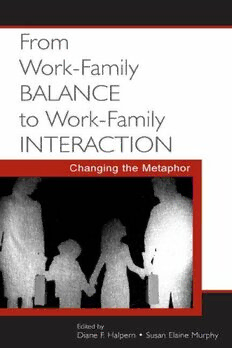
From Work-Family Balance to Work-Family Interaction: Changing the Metaphor PDF
299 Pages·2004·19.036 MB·English
Most books are stored in the elastic cloud where traffic is expensive. For this reason, we have a limit on daily download.
Preview From Work-Family Balance to Work-Family Interaction: Changing the Metaphor
Description:
There are many lessons to be learned about work-family interaction. It is clear that some people have learned how to combine work and family in ways that are mutually supporting--at least much of the time--and some employers have created work environments and policies that make positive interdependence of these two spheres more likely to occur. This book discusses measures of work-family, conflict, policies designed to reduce conflict, comparisons with other industrialized nations, and reasons why family-friendly work-policies have not been adopted with enthusiasm. The purpose is to consider a broad range of topics that pertain to work and family with the goal of helping employers and working families understand the work-life options that are available so they can make choices that offer returns-on-investments to employers, families, and society at large that are consistent with personal and societal values.This book brings together a superb panel of experts from different disciplines to look at work and family issues and the way they interact. Part I is an overview--with a brief discussion by a psychologist, economist, and a political scientist--each of whom provide their own interpretation of how their discipline views this hybrid field. Part II considers the business case of the question of why employers should invest in family-friendly work policies, followed by a section on the employer response to work family interactions. Families are the focus of the Part IV, followed by a look at children--many of whom are at the heart of work and family interaction.
See more
The list of books you might like
Most books are stored in the elastic cloud where traffic is expensive. For this reason, we have a limit on daily download.
